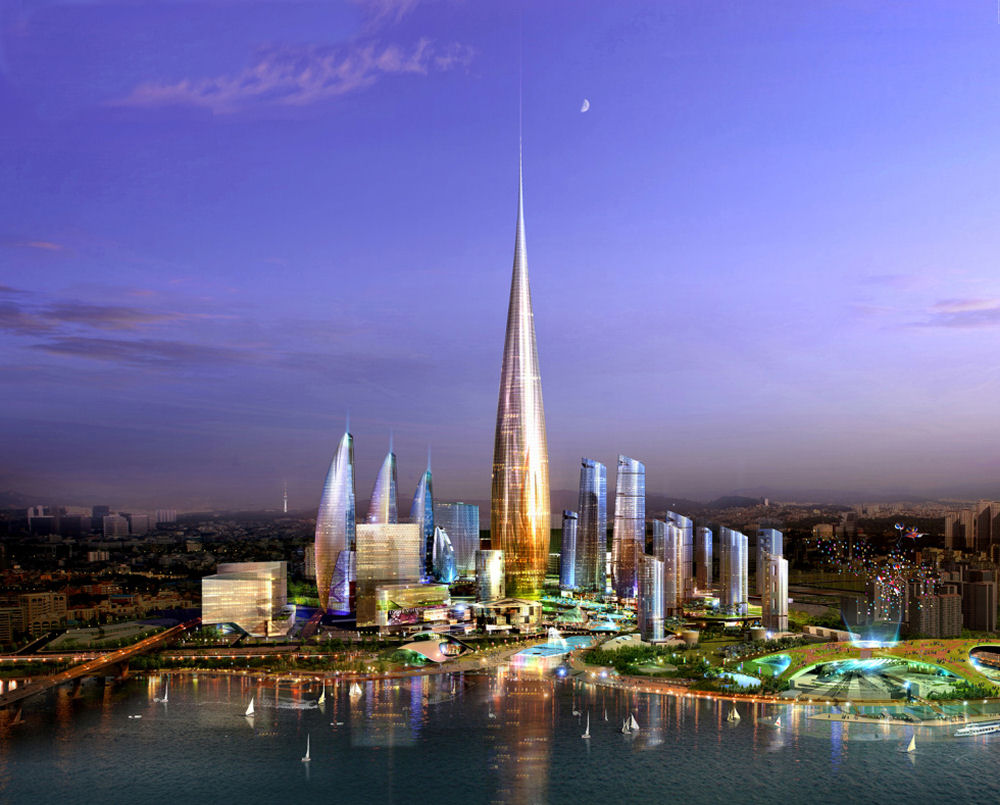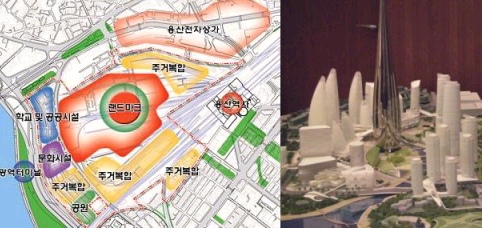
Five major architects have been shortlisted to redesign the business hub of South Korea’s capital city. Asymptote (with Hargreaves Associates), Foster + Partners, Jerde Partnership, Skidmore Owings and Merrill and Studio Daniel Libeskind have been given US$1m to submit designs to the Yongsan Development Co. for the US$27bn rejuvenation of the Yongsan international business district.
Seoul's Yongsan district, whose development has been limited by the presence of railroad and U.S.military facilities, will get a massive facelift and be transformed into an international business hub by 2016, prospective developers said Saturday (Nov.3).
The 28-trillion-won ($31 billion) project, aimed at transforming 566,800 square meters of land currently owned by state-run Korea Railroad Corp. (KORAIL) and parts of Icheon-dong, calls for the building of a landmark 152-story building, two six-star luxury hotels and 12 office towers.
The landmark building to be shaped like a drop of water could reach around 620 meters, which would make it one of the tallest buildings in the world.
Samsung and the National Pension Fund, which is leading the consortium designated as the primary negotiation partner by KORAIL on Friday, said Yongsan is to be developed so it can become a "dream hub" for global information technology, finance and tourism.
Samsung said it planned to pay roughly 8 trillion won to purchase the necessary land.
Under the plan, the new Yongsan business center will also have parks and residential areas, while a riverfront property between the Han River Railway Bridge and the Wonhyo Bridge is to be turned into an international port.
Full use of the port is contingent upon improved inter-Korean relations since ships would have to pass through the mouth of the Han River, which is currently off-limits because of its proximity to the inter-Korean border.
The project, scheduled to kick off in 2011, is the largest urban development work in South Korea's history and part of the ongoing effort to transform the country into a key Northeast Asian business center similar to Hong Kong and Singapore.
The country has designated three free economic zones, located in the cities of Incheon, Busan and Gwangyang, to attract foreign investment.
Experts said KORAIL is pushing to seal a formal deal with the Samsung-led consortium in the near future so the project can be carried out smoothly. The company is expected to use the profits from selling the land to pay back most of its 5.6 trillion won worth of debts.
Industry sources also said the project could be a boon to local construction companies, which have been tightly regulated by the government in an attempt to rein in housing prices, and help attract vital foreign investment.
Foreign direct investment (FDI) in Korea plunged more than 31 percent in the first half from a year earlier due to fewer corporate merger-and-acquisition deals.
FDI in the first half reached $3.36 billion, down from $4.92 billion a year earlier, much lower than the government's FDI target of $11 billion for this year.
They added that the project, coupled with the relocation of the main U.S. military base from Yongsan to Pyeongtaek, will open a new chapter in the development of South Korea's capital city.
Samsung said major U.S., Dutch and Middle Eastern real estate developers have expressed interest in the project, but did not elaborate.






 cityup.org 传真电话:010-88585380
cityup.org 传真电话:010-88585380